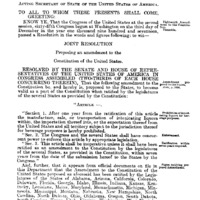Contents
- Constitution Day: Prohibition
- Prohibition in Illinois
Prohibition in Illinois
Temperence was a popular movement that appeared as early as 1833 in Illinois. Temperance Society, a branch of the American Temperance Society as well as the Women's Christian Temperence Union were some of the societies that fought for a state-wide prohibition.
In 1907 the general assembly passed a local option bill sponsored by the Anti Saloon League that dried up two-thirds of Chicago precincts by 1909.
The Illinois issue. (Chicago, Ill.) October 04, 1907
In 1919 Illinois lawmakers ratified the Eighteenth Amendment to the United States Constitution, making the manufacture, sale, and transport of alcohol illegal in the state.
Ratification of 18th Amendment on January 8, 1919
On the contrary to the belief that Prohibition would improve health, reduce crime, and lower violence, Chicago’s location made it a natural spot to become the major center for bootlegging in the country. Mobsters in New York, Chicago became the capital of racketeers. They included the powerful Al Capone, “Bugs Moran,” Johnny Torrio, the Gennas, and the O’Banions.
Letter concerning prosecution of an Illinois prohibition law violation on June 21, 1933
In 1933, Congress proposed repealing Prohibition with the 21st Amendment. Illinois ratified the 21st Amendment on July 10, 1933; and on December 5, Congress officially adopted the amendment, ending Prohibition.
Illinois Blue Book, Resolution on the repeal of the Eighteenth Amendment




